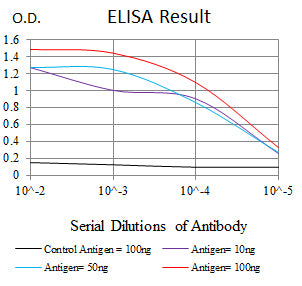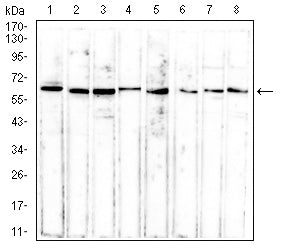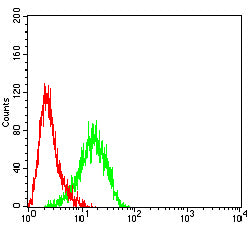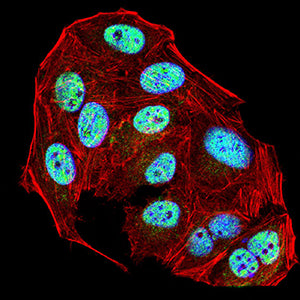



| WB | 1/500 - 1/2000 | Human,Mouse,Rat |
| IF | 咨询技术 | Human,Mouse,Rat |
| IHC | 1/200 - 1/1000 | Human,Mouse,Rat |
| ICC | 1/200 - 1/1000 | Human,Mouse,Rat |
| FCM | 1/200 - 1/400 | Human,Mouse,Rat |
| Elisa | 1/10000 | Human,Mouse,Rat |
| Aliases | UV20; COFS4; RAD10 |
| Entrez GeneID | 2067 |
| clone | 5A2C3 |
| WB Predicted band size | 32.5kDa |
| Host/Isotype | Mouse IgG1 |
| Antibody Type | Primary antibody |
| Storage | Store at 4°C short term. Aliquot and store at -20°C long term. Avoid freeze/thaw cycles. |
| Species Reactivity | Human, Mouse |
| Immunogen | Purified recombinant fragment of human ERCC1 (AA: 1-297) expressed in E. Coli. |
| Formulation | Purified antibody in PBS with 0.05% sodium azide |
+ +
以下是3-4条关于ERCC1抗体的参考文献及摘要概括:
---
1. **文献名称**: *ERCC1 Expression and Outcome of Platinum-Based Chemotherapy in Non-Small Cell Lung Cancer*
**作者**: Olaussen KA, et al.
**摘要**: 本研究通过免疫组化(ERCC1抗体:8F1克隆)检测非小细胞肺癌(NSCLC)患者肿瘤组织中ERCC1蛋白表达,发现ERCC1阴性患者接受顺铂辅助化疗后生存期显著延长,提示ERCC1抗体检测可用于预测铂类药物疗效。
---
2. **文献名称**: *Antibody Specificity and Immunohistochemical Detection of ERCC1 in Clinical Trials*
**作者**: Bhagwat NR, et al.
**摘要**: 研究评估了不同ERCC1抗体(包括克隆号8F1和4F9)的特异性,发现部分抗体存在交叉反应(如与PCNA结合),导致临床样本检测结果不一致,强调抗体验证对研究可靠性的重要性。
---
3. **文献名称**: *Comparative Analysis of ERCC1 Antibodies for Prognostic Utility in Solid Tumors*
**作者**: Friboulet L, et al.
**摘要**: 通过对比多种ERCC1抗体(如克隆号8F1、4F9、D-10)在卵巢癌和肺癌中的检测结果,发现不同抗体对ERCC1蛋白异构体的识别差异显著影响患者预后评估,建议标准化抗体选择以提高临床相关性。
---
4. **文献名称**: *ERCC1 mRNA and Protein Expression in Advanced Colorectal Cancer*
**作者**: Simon GR, et al.
**摘要**: 研究采用ERCC1抗体(克隆号FL-297)检测结直肠癌组织,发现低ERCC1蛋白表达与奥沙利铂化疗敏感性相关,但抗体检测结果与mRNA水平不完全一致,提示需结合多指标分析。
---
这些研究均围绕ERCC1抗体的临床应用展开,重点探讨抗体特异性、检测标准化及其在预测化疗反应中的作用。
ERCC1 (Excision Repair Cross-Complementation Group 1) is a critical protein involved in DNA repair mechanisms, particularly the nucleotide excision repair (NER) pathway. It forms a heterodimeric complex with XPF (xeroderma pigmentosum group F), which is essential for resolving DNA crosslinks and repairing bulky DNA lesions caused by UV radiation, chemical agents, or chemotherapy drugs like cisplatin. ERCC1’s role in maintaining genomic stability has made it a focus in cancer research, as its expression levels are often linked to tumor resistance to platinum-based therapies and patient prognosis.
ERCC1 antibodies are widely used in research and diagnostics to detect and quantify ERCC1 protein expression in tissues or cell lines. These antibodies enable the study of ERCC1’s functional role in DNA repair, its interaction with XPF, and its potential as a biomarker. Clinically, ERCC1 expression is assessed to predict the efficacy of platinum-based chemotherapy in cancers such as non-small cell lung cancer (NSCLC), ovarian cancer, and colorectal cancer. Low ERCC1 levels are generally associated with better therapeutic responses, while high expression may indicate resistance.
Despite its utility, challenges remain in standardizing ERCC1 antibody assays due to variability in antibody specificity, tissue fixation methods, and scoring protocols. Additionally, some studies debate the reliability of ERCC1 as a standalone predictive biomarker, emphasizing the need for multi-gene or protein panels. Ongoing research aims to refine detection techniques and explore ERCC1’s broader implications in aging, neurodegeneration, and personalized cancer treatment.
×